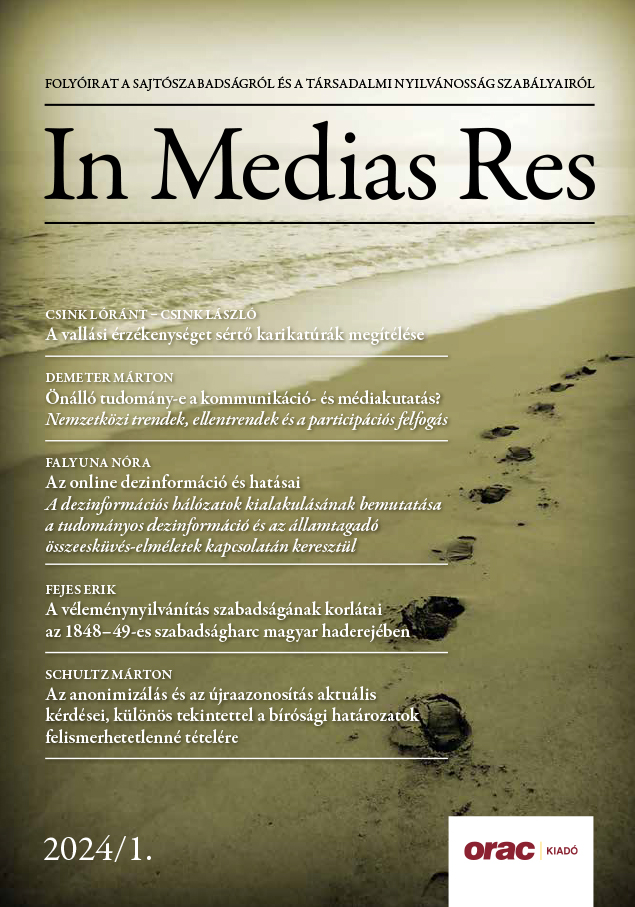The Regulation of Internet Access Restrictions in India in the Light of Judicial Practice
DOI:
https://doi.org/10.59851/imr.13.1.9Keywords:
internet access restrictions, India, Supreme Court, Telegraph Act, Digital IndiaAbstract
While it is vital for the protection of fundamental rights that everyone has unrestricted access to an open, secure and reliable internet, India has had the most internet restrictions in the world for five consecutive years, and the number of known shutdowns and restrictions may not even reflect the real data. The study looks at the legal framework for internet restrictions in India through the country’s judicial practice and questions if the proposed „modern and future-ready legal framework”, the Digital India Act, will address the practice of restrictions that are not always justified, as the government appears set to continue its previous practice in 2024.
References
Bozóki András – Hegedűs Dániel: A kívülről korlátozott hibrid rendszer. Politikatudományi Szemle, 2017/2., 8–17.
Gosztonyi Gergely: Az internet-hozzáférés korlátozásának gyakorlata az Emberi Jogok Európai Bírósága előtt. In Medias Res, 2021/1., 91–101.
Gosztonyi, Gergely: Special Models of Internet and Content Regulation in China and Russia. ELTE Law Journal, 2021/2., 87–99., https://doi.org/10.54148/ELTELJ.2021.2.87
Gosztonyi Gergely: Cenzúra Arisztotelésztől a Facebookig. A közösségi média tartalomszabályozási gyakorlatának komplexitása. Budapest, Gondolat, 2022., https://doi.org/10.24362/cenzura.gosztonyi.2022
Gupta, Kavya: Permissibility of Internet Shutdown in India: An Interminable Enigma. 2(4) Jus Corpus Law Journal (2022) 819–831.
Gyetván Dorina: A cenzúra privatizációja avagy a cenzúra új virágkora? In Gosztonyi Gergely (szerk.): A velünk élő történelmi cenzúra. Budapest, Gondolat, 2022, 57–69.
Halasi Gábor: Egy forrongó tartomány: Kasmír. Biztonságpolitika, 2019. március 11., https://bit.ly/3wqnTKi.
Jagani, Aishwarya: India’s Great Firewall. 52(1) Index on Censorship (2023) 68–71., https://doi.org/10.1177/03064220231165392
Jain, Shilpa – Variath, Adithya Anil: Internet Shutdowns and Virtual Curfews: Searching for Rights in Digital Darkness. 4(2) CASIHR Journal on Human Rights Practice (2020) 35–48.
Kelemen Roland – Farkas Ádám: A közösségimédia-platformok és a hibrid konfliktusok kapcsolata. In Medias Res, 2022/1., 96–108.
Kulshrestha, Anunay – Grover, Gurshabad: The Indian Telecommunication Bill Engenders Security and Privacy Risks. Lawfare, 2023. március 9., https://bit.ly/44vvILo.
Kuwar, Ishwari D.: Anuradha Bhasin v. Union Of India. Law Essentials, 2022. január 16., https://bit.ly/4bv02YH.
Papp János Tamás: A közösségi média szabályozása a demokratikus nyilvánosság védelmében. Budapest, Wolters Kluwer, 2022.
Sethi, Purna Chandra – Behera, Prafulla: Network Traffic Management Using Dynamic Bandwidth on Demand. 15(6) International Journal of Computer Science and Information Security (2017) 369–375.
Steinfeld, Jemimah: Can India Survive More Modi? 52(1) Index on Censorship (2023) 1., https://doi.org/10.1177/03064220231165359
Török Bernát: Közösségi média – társadalmi párbeszéd. Fundamentum, 2022/3., 57–61.
Tripathi, Salil: Modi’s Singular Vision for India. 52(1) Index on Censorship (2023) 60–65., https://doi.org/10.1177/03064220231165389
Downloads
Published
How to Cite
Issue
Section
License
Copyright (c) 2024 Gosztonyi Gergely

This work is licensed under a Creative Commons Attribution 4.0 International License.


